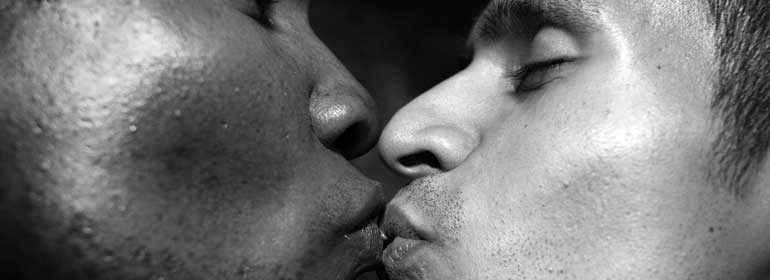New genetic research has found that homosexuality is essential for the survival of the species. Homophobes take note, says Rob Buchanan.
At the dawn of genetics the persistence of homosexuality in the human race was seen as a bit of a paradox. The pool of self-identifying homosexuals was too stable, not to mention to demonstrably healthy, to be some type of genetic aberration. If homosexuality was passed down by gay parents, it would seem to be a fairly dead-end form of genetic abnormality, given the distinctly low odds of gay men and lesbians hooking up sexually. Though until fairly recently many closeted people were forced in to marriages (and reproduction) because of customs or social pressure, this could never account for the sheer volumes of gay people on the planet. And we know that the massive majority of gay kids have straight parents.
However, with the advances in gene interactions and the convergence of many other fields, from game theory and socio-biology, it became apparent that genes are playing a far more complex game. Being bent clearly isn’t some vestigial throwback or non-Darwinian mutation. Homosexuality is useful to humanity and it’s here to stay.
Exciting new research by Dr. Diana Fleischman and the University of Portsmouth has linked homoerotic thoughts to human cooperation. The study in to the socio-biology of homosexual thoughts confirms what many researchers have suggested for years: the persistence of homosexuality throughout human evolution, and the evolution of all the higher mammals, points to it providing some essential element to the survival of the species which goes beyond simple reproduction.
I included a longer and more complex explanation of the science bits in my blog Do These Genes Make Me Look Gay. So how could a seeming Darwinian ‘handicap’ like not being able to directly reproduce be such a vital advantage to our genes that it would not be bred out? The conclusions of the University of Portsmouth confirm previous results, linking homosexuality, or homoerotic behaviour in heterosexuals, to bonding behaviour essential for cooperation and survival.
This angle has been previously observed by cultural anthropologists, from the historical records of classical civilisations and also modern day developing cultures from as far-flung regions as The Amazon and West Africa. Bonding behaviour, it seems, is the sticky glue that has been holding human civilisation together since we first gave each other a good old non-homo blowjob at the back of the cave.
An interesting twist to the Portsmouth study was the linking of higher levels of the hormone progesterone (which predisposes individuals to think about members of their own sex) to bonding and affiliation. If you consider our ancestors on the Savannahs of Africa or the primeval forests of Europe, the benefits of prehistoric hunter-gatherers being able to get on with other hunter-gatherers, and cave ladies with other cave ladies is obvious. Homo sapiens of the same gender needed able to cooperate and set their egos aside in order to survive.
In tandem with measuring levels of progesterone in the study’s subjects, they were also subjected to a battery of tests, including being asked to rate their responses to homoerotic stimuli, and platonic same-sex affection. In the Archives of Sexual Behaviour, where the study was published, Dr. Fleischman concluded: “Having some degree of attraction to the opposite sex is a type of adaptive behaviour, and in any adaptive behaviour you will see extremes of the spectrum, hence some people will only be attracted to members of the same sex. But the research suggests that having exclusively heterosexual thoughts is a disadvantage – it’s better to be a little bit attracted to the same sex.”
Progesterone is mainly found in the adrenal glands of men and it has long been linked to fraternal bonding. Previous studies have shown how hormones present in male sweat also has an effect of calming other males and inducing them towards cooperation. The obvious applications of this, from an evolutionary point of view, were making it more pleasant and less hostile for men to work together in labour-intensive environments.
Although, from watching the news, it may seem that we are doing everything we can to bomb and behead each other to doomsday, on the whole nothing could be further from the truth. The overwhelming drive in human nature is to show compassion and affection towards each other. This translates into cooperation and harmony on a human scale, which in turn builds the foundations for civil societies.
Homoerotic cooperative behaviour is reflected in primates who forge deep and complex bonds in colonies where foraging for food and caring for offspring combines complex behaviours with predictable gender roles. Sexual fluidity, and willingness to be hands-on with each other, act as a social lubricant.
The conclusion of the Fleischman study was that homosexual thoughts are “an essential part of human evolution”. There are important social lessons to reflect on from this research. We can learn to see ourselves not just as individuals, but as part of a species. No matter how proud or independent we are, we need each other in all our diversity. Our survival as a species depends on interaction and trust.
As queers, we should feel empowered to understand we are as vital a part of the human evolutionary process as everyone else. We should use our unique tools for same-sex bonding to help forge links with members of our own gender. Likewise, straight people should be proud to bond with members of their own gender too.
The ultimate message of this survey is that homophobia is null and void. Instead of being afraid of or rejecting same-sex attraction, it should be embraced because it is an essential component of the human race.
© 2014 GCN (Gay Community News). All rights reserved.
